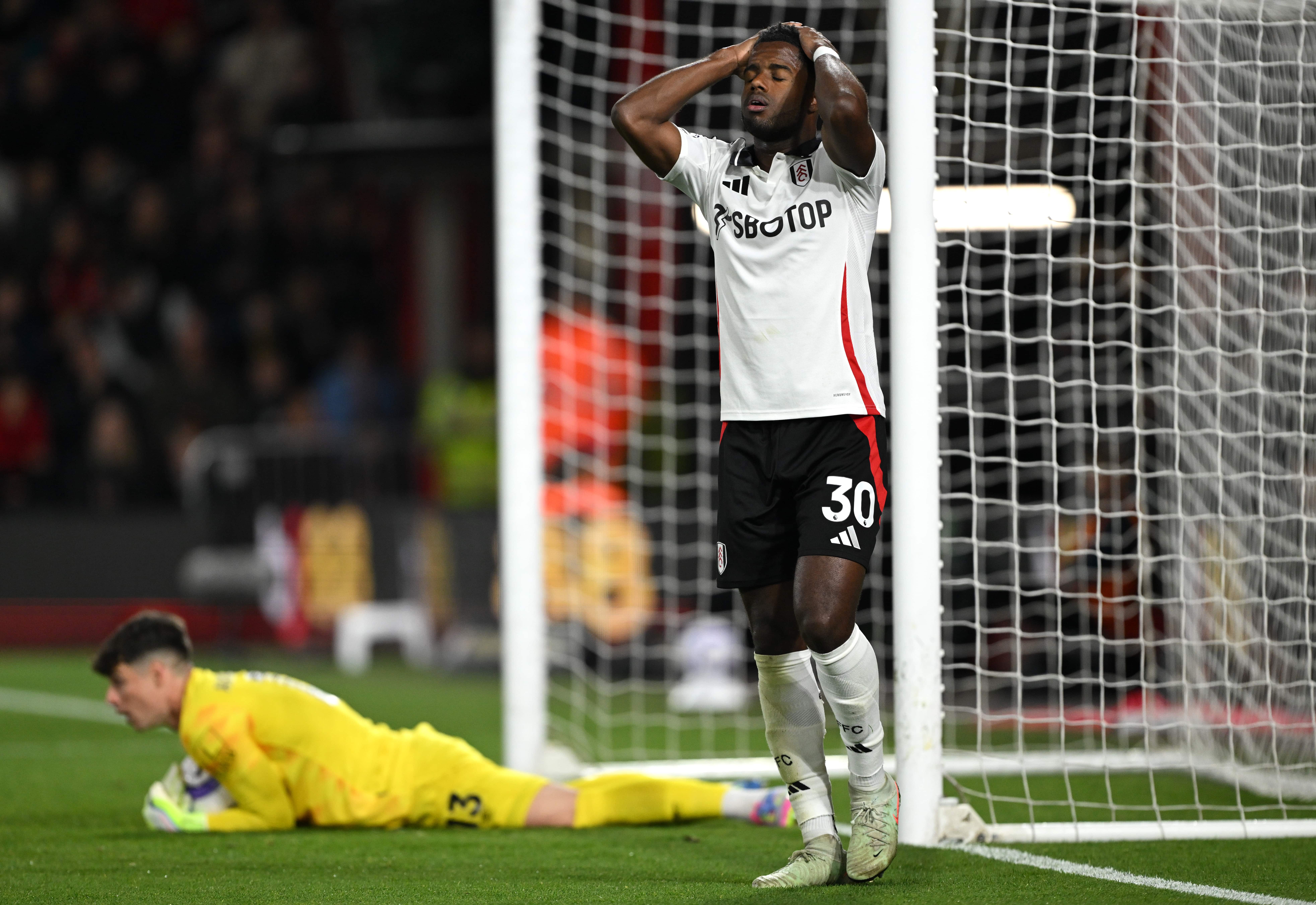Howay the entertainers: Reliving Newcastle's 1995/96 title challenge, by the players
It’s 20 years since one of the Premier League’s most exciting teams faltered after leading by 12 points. The Magpies' main men from that era talk you through the key games of a thrilling season. You’ll LOVE it...
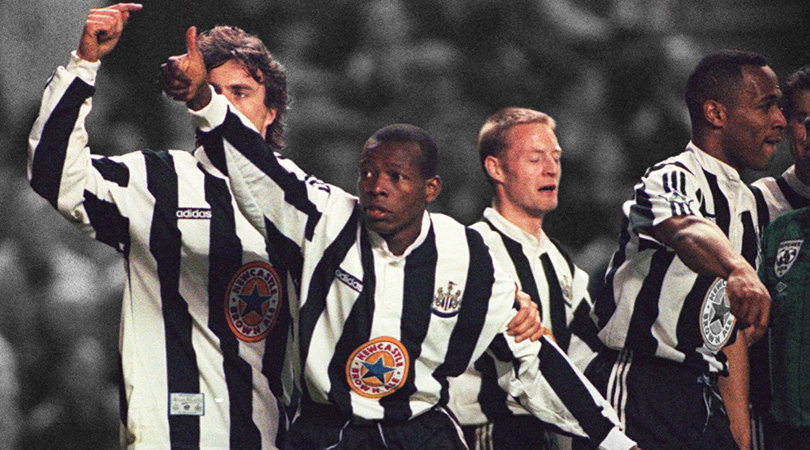
Newcastle United’s 1995/96 season, as the cliché goes, had everything. It had great moments (“I will love it if we beat them”), great games (that 4-3 defeat at Anfield), great stats (12 points clear in early February) and great myths.
Our memories tell us that Kevin Keegan’s side scored for fun that season, and conceded just as easily. In fact, they found the net just 66 times, one fewer than in the previous campaign, and conceded 37, only two more than eventual champions Manchester United. But why let the truth get in the way of a great story? And what a story it was. “The trouble is,” says left-back John Beresford, “we were having such a good time that it flew by, and we didn’t get a chance to take it all in.”
Setting the scene
After finishing sixth, and backed by Sir John Hall’s millions, the Toon regrouped that summer, signing Les Ferdinand from QPR and David Ginola from PSG
Newcastle had returned to the top flight with a bang in 1993/94, scoring 82 goals as they finished third in their first season back. Nearly half of those goals had come from Andy Cole, though, who was sold to Manchester United in January 1995.
After finishing sixth, and backed by Sir John Hall’s millions, the Toon regrouped that summer, signing Les Ferdinand from QPR and David Ginola from PSG, as well as goalkeeper Shaka Hislop and England right-back Warren Barton (Tino Asprilla and David Batty would join them in February).
Inspired by Keegan – “We would have jumped off the Tyne Bridge for him,” says Beresford – Newcastle believed they could mount a serious title challenge. They were great to watch, playing in an attacking 4-4-2 formation with two out-and-out wingers.
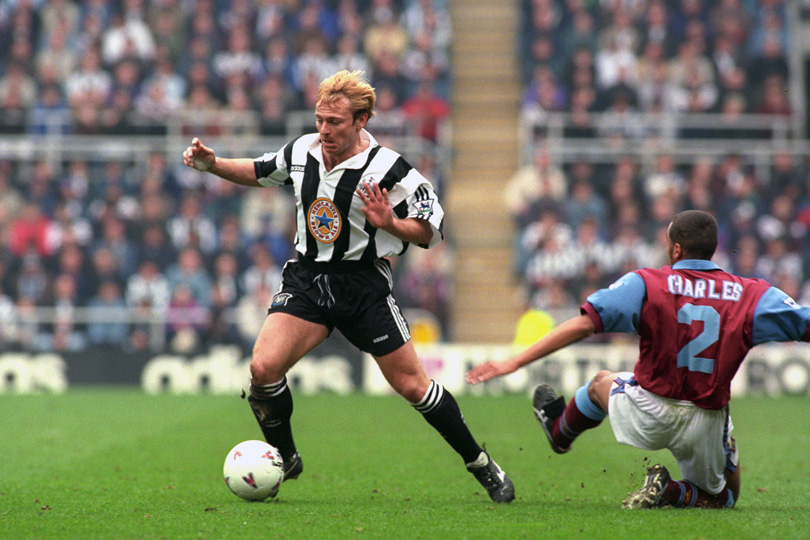
“I watch the Premier League now and I get bored,” Rob Lee, their star midfielder that season, tells FourFourTwo. “I’ve never seen so many 0-0s. We didn’t play in any that season. And Keegan never told us to take the ball into the corner if we were 2-1 up. We were told to try to get a third goal, then a fourth.”
Get FourFourTwo Newsletter
The best features, fun and footballing quizzes, straight to your inbox every week.
That gung-ho approach, allied with a lack of title-winning experience within the squad, ultimately proved to be their downfall. Unlike their title rivals Manchester United, who by then were approaching the height of their unpopularity under Alex Ferguson, Newcastle found it increasingly difficult to grind out results on the road. Just one of the Magpies’ eight defeats that season came at a rapturous St James’ Park.
“But I wouldn’t change a thing,” insists Beresford. “And I know people will say it’s sour grapes, but I think it would have been great for football if we’d won the league. That’s why neutrals want Leicester to win it this season – everybody loves a team who go for it, who entertain. And we entertained. How many other teams are still remembered for finishing second?”
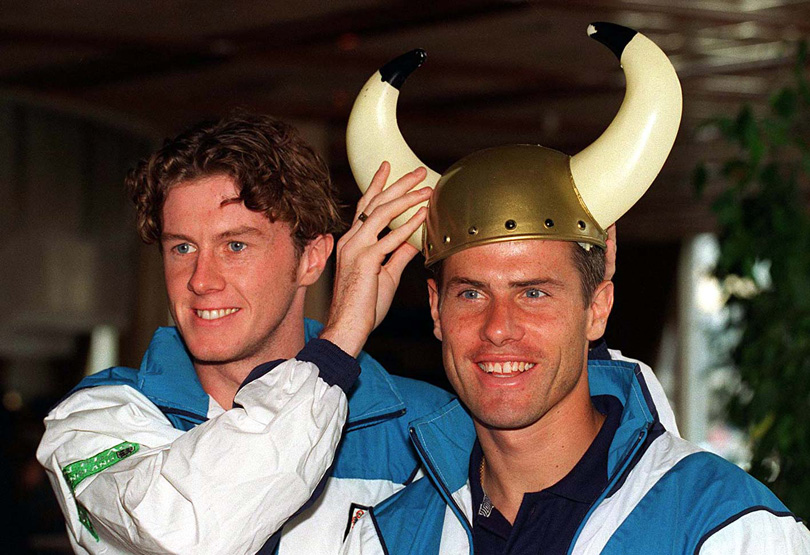
Newcastle United 3-0 Coventry City
St James’ Park, August 19, 1995
We had a nucleus of players who were on the fringes of the England team, which meant they were hungry, and we had a great team spirit
It didn’t take long for Rob Lee to realise that Newcastle’s class of 1995/96 were on the verge of something special. “It was the opening game of the season,” the former England midfielder tells FFT. “The sun was shining, the atmosphere at St James’ Park was electric and we were 2-0 up – although it could have been quite a few more. I remember thinking: ‘We’ve got a very good team here’. We had a nucleus of players who were on the fringes of the England team, which meant they were hungry, and we had a great team spirit, which made it easy for new players to settle in quickly.
“We were a little bit weak physically the season before, so we made some ‘strong’ signings, and because the manager was under pressure after selling Andy Cole to Manchester United in January, he made all his summer signings pretty much as soon as the season had finished, which took the pressure off. I’d been trying for ages to persuade Les [Ferdinand] to join Newcastle, while Warren Barton and Shaka Hislop were solid performers. Ginola was the bonus.”
Ginola? Bonus? “We hadn’t really heard of him. We had Scott Sellars already on the left, who was doing a very good job. We thought: ‘Is Ginola going to be better than Scott?... Oh!’”
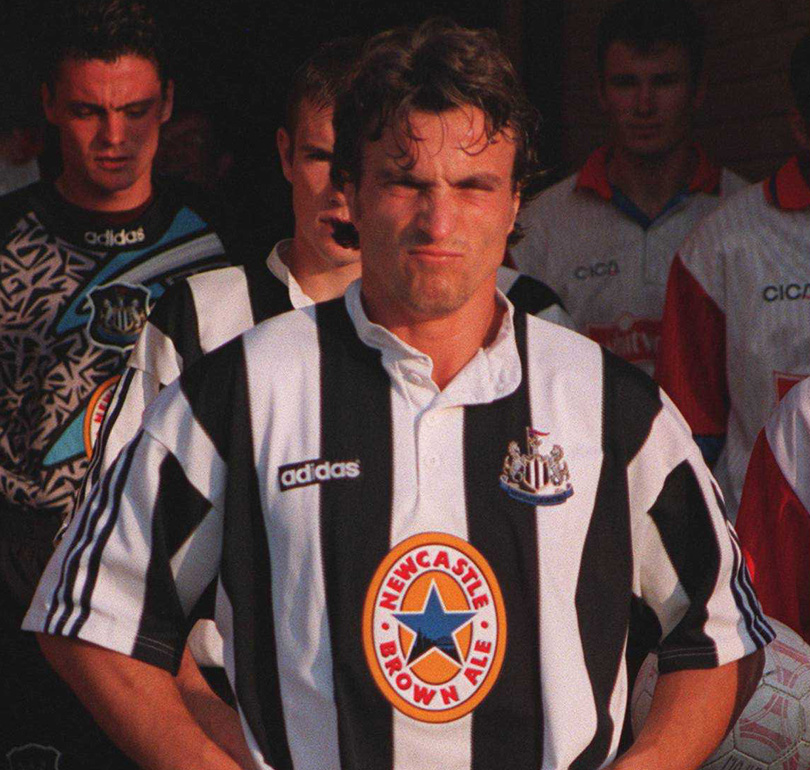
So with an improved squad, having finished sixth in the Premier League the previous season, what was the aim before the big kick-off? A UEFA Cup place? “We were trying to win the title,” insists Lee. “Believe it or not, that’s genuine. Keegan’s mindset was always ‘if we are in a competition, let’s have a go’.”
We thought: ‘Is Ginola going to be better than Scott?... Oh!
And despite having to “pick and choose” when to get forward from central midfield now he had all this other attacking talent around him, it was Lee who opened Newcastle’s account in the seventh minute. He recalls: “The ball went wide to Keith Gillespie, who was the quickest player I’d ever seen. I had a quick look around to make sure Lee Clark was behind me and then I ghosted into the box. The ball came in and I managed to loop a good header beyond John Filan in the Coventry goal. It was one of my trademark goals, really.”
Peter Beardsley doubled Newcastle’s lead with a penalty eight minutes from time, before Lee briefly broke from his epiphany to put Ferdinand through for a debut goal. The striker remembers: “It was only after watching the replay and seeing the reaction from everybody – not just the Newcastle supporters but the players and the coaching staff as well – that I knew how important that goal was.”
With Ginola, Ferdinand and, indeed, Lee on fire, Keegan’s men flew out of the traps, producing some of the most scintillating football in Premier League history. “That’s just the way we played football, and I loved it,” says Lee. “The fact that everybody remembers that team, even though we finished second, makes me very proud. I believe football should be entertainment, and we entertained. I wouldn’t change anything, not even a Premier League title, for playing in a team like that.”
Lee echoes Beresford’s statement, adding: “That’s why everyone’s rooting for Leicester this season. They have a go at teams, like we did, and not many people do that anymore.”
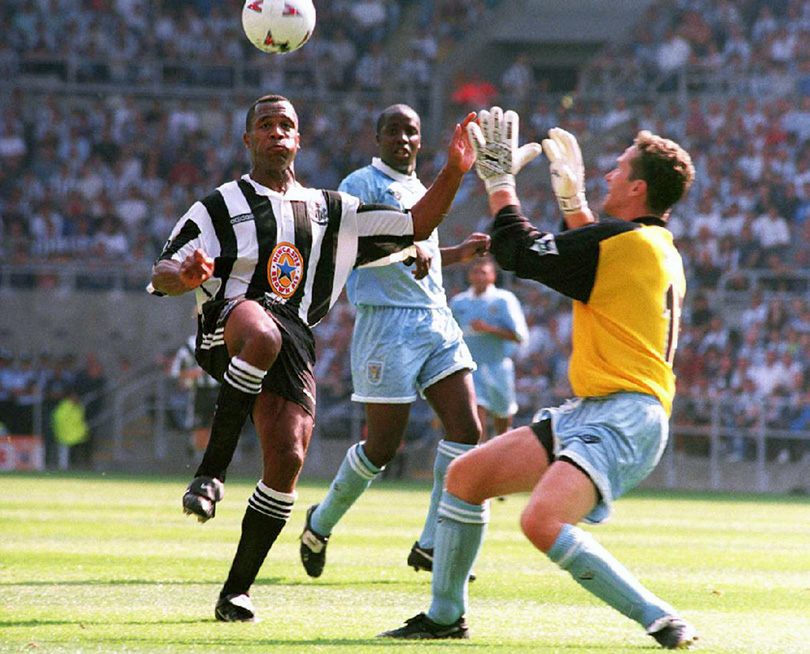
GAMES Laying the groundwork • Vinnie in goal • Just score one more • One-nil to United • Collymore closing in • "I'd love it"
Newcastle United 6-1 Wimbledon
St James’ Park, October 21, 1995
I remember the ball being crossed in and Rob Lee could easily have headed at goal, but he didn’t because he felt it was more important for me to get a hat-trick than for him to get on the scoresheet. That summed up the spirit we had
If one game represented Newcastle’s ’95/96 season, this was it: all-out attack, the odd defensive lapse, the St James’ Park crowd in raptures... but the hero that day believes one particular moment was the team in microcosm. “It was my hat-trick goal – the team’s fifth,” Les Ferdinand tells FFT. “I remember the ball being crossed in and Rob Lee could easily have headed at goal, but he didn’t because he felt it was more important for me to get a hat-trick than for him to get on the scoresheet. That summed up the spirit we had.”
A late bloomer, ‘Sir Les’ had joined Newcastle that summer for £6 million, aged 28, having scored 24 Premier League goals for QPR the previous season. With fellow signings Ginola and Gillespie – who’d joined in January as part of the controversial deal that took Andy Cole to Manchester United – providing the kind of service that he thrived on, Ferdinand made a flying start, scoring 10 goals in his first nine league games in the north-east.
By the time Wimbledon came to Toon in October, the England striker was on the verge of equalling a post-war club record of scoring in seven straight league games. “They make you aware of that sort of thing up in Newcastle,” he recalls. “There had been a bit of talk about it, but my form and the way the team was playing meant it didn’t matter what was at stake – I felt I was going to score in every game.”
In fact, Newcastle huffed and puffed for half an hour before the big, bad wolf – in the unlikely form of defender Steve Howey – finally blew the Dons’ house down. The next two goals, within the space of six first-half minutes, were vintage Ferdinand. He says: “All the local press had been going on about how they’d had great goalscorers down the years but never really someone who could head the ball, particularly in the Premier League era, which was one of my great strengths. I scored a header in my second game, against Bolton, and one of the journalists told me that the previous season it had taken Newcastle until November or December to score a header.”
My form and the way the team was playing meant it didn’t matter what was at stake – I felt I was going to score in every game
Against Wimbledon, the latest wearer of the famous No.9 shirt rose majestically to meet Ginola’s left-wing cross after 35 minutes, and he made it 3-0 soon afterwards when he hurled himself at Gillespie’s near-post centre from the opposite flank.
The game took a comical turn in the second half when away keeper Paul Heald came flying out of his area to take down Ferdinand and was sent off for a second bookable offence, the first having been for time-wasting at 1-0 down. With injury having forced Joe Kinnear to make his three substitutions (and no fit keeper on the bench anyway), Vinnie Jones ended up in goal. “He made some great saves,” says Ferdinand. “When the Gallowgate End started cheering him on, he turned into Sylvester Stallone in Escape to Victory.”
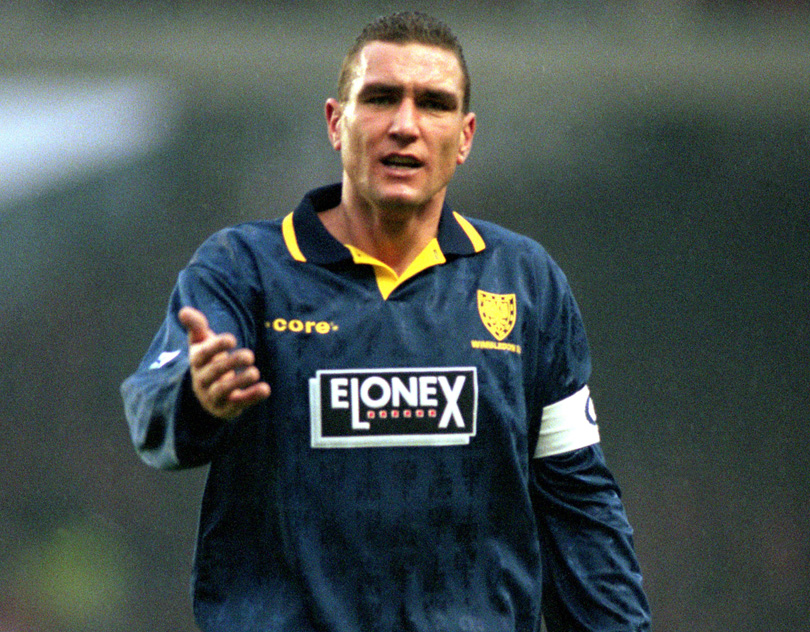
But the hardman-turned-gloveman was powerless to prevent stunning goals from two more unlikely scorers, defensive midfielder Lee Clark and centre-back Philippe Albert, in between which Marcus Gayle appeared in the area unmarked to head a consolation and Ferdinand bundled in his third. “I’ve still got the match ball somewhere,” he says. “But it wasn’t about personal glory – it was about the team, as that goal demonstrated more than any other I scored for Newcastle.”
And despite the team falling agonisingly short, it was a season of personal triumph for Ferdinand, who scored on the final day to beat his tally of 24 goals in the previous campaign and win PFA Player of the Year. Arise, Sir Les.
GAMES Laying the groundwork • Vinnie in goal • Just score one more • One-nil to United • Collymore closing in • "I'd love it"
Newcastle United 2-1 Bolton Wanderers
St James’ Park, January 20, 1996
Kevin Keegan’s side were dumped out of the FA Cup by Glenn Hoddle’s Chelsea in a St James’ Park replay
For a club enjoying a healthy lead at the top of the table, it had been a bad week. Days before the league visit of cellar-dwellers Bolton, Kevin Keegan’s side were dumped out of the FA Cup by Glenn Hoddle’s Chelsea in a St James’ Park replay. Belgian defender Philippe Albert scored the opener in that match but was powerless to prevent his side from tumbling out of the tournament on penalties following a late Ruud Gullit equaliser, converting his own spot-kick only after Steve Watson and Peter Beardsley had already missed.
Now they faced Bolton, a side with just one point from 11 away matches and desperately devoid of confidence. They were the perfect opposition as Newcastle looked to stretch their lead over the chasing duo of Manchester United and Liverpool.
The Red Devils wouldn’t play until the Monday night, when they travelled to east London to take on West Ham, but Albert tells FFT that their title rival’s form wasn’t on the Newcastle players’ minds as they attempted to extend the gap at the top to 12 points.
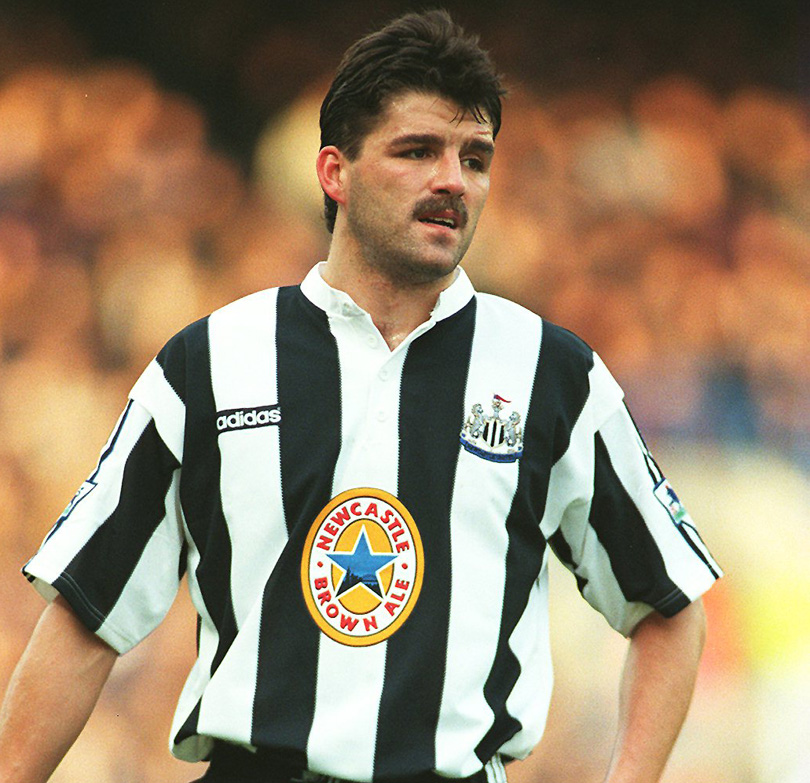
“It was just like any other game,” says Albert. “Whoever we played, the manager would always say one thing before we ran out: ‘Just go out and make you score one more than them’. At home that was never a problem. Playing in front of that crowd at that time was an incredible experience – it would make the hairs on the back of your neck stand up. We had just beaten Arsenal 2-0 at home and nobody fancied going up there and trying to take the game to us.
“People talk about the attacking potential of that side but they forget we didn’t really leak many goals either. We defenders were encouraged to get forward, yes, but we knew not to leave any gaps.”
Whoever we played, the manager would always say one thing before we ran out: ‘Just go out and make you score one more than them’
Despite missing Les Ferdinand, absent with a rib injury, Newcastle took an early lead through his deputy, Paul Kitson. Then Bolton, who were marooned at the bottom of the table with just 13 points from 24 matches, scored a shock equaliser. A Warren Barton foul on Sasa Curcic led to Scott Sellars – sold by Newcastle only a month previously – providing a free-kick that was headed in off the far post by the onrushing Gudni Bergsson.
“Maybe that gave us the kick up the backside we needed,” muses Albert. “We hadn’t really suffered too many setbacks up to that point, but a point at home against the bottom side would have felt like two dropped.
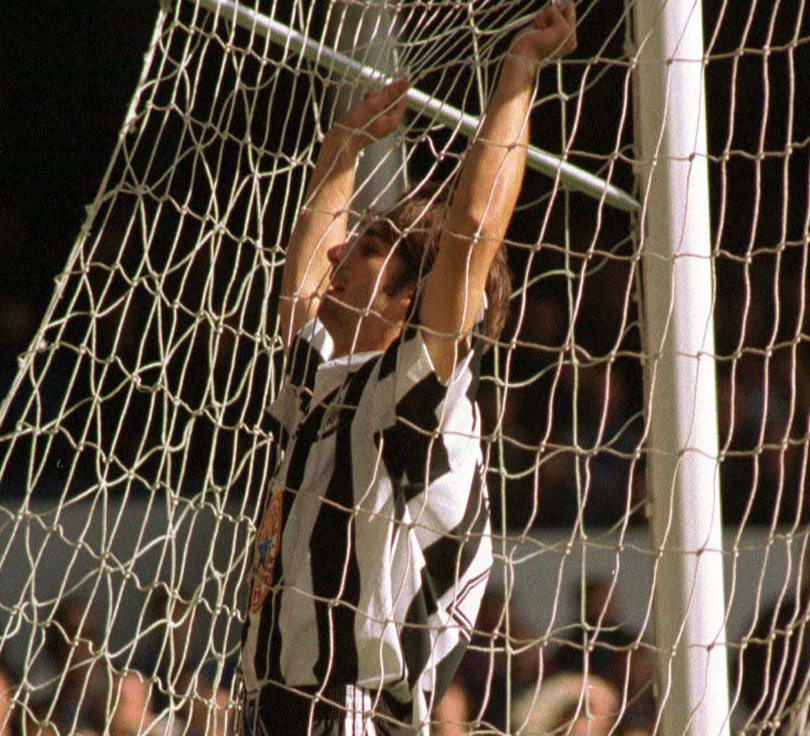
“It’s a measure of the way we played and the confidence we had, though, that we struck back pretty quickly. I think Peter Beardsley scored our second.” He’s right. The England man, who’d just celebrated his 35th birthday, pounced with his fifth goal of the campaign to put the Geordies 2-1 up at half-time.
“I don’t think Kevin said too much at the break,” says Albert. “It was really just a case of us carrying on playing the way we always did. To be honest, we didn’t think too much about the potential points difference over Manchester United if the score stayed as it did. It’s a cliché, but we really were taking it a single game at a time.”
The second half was a non-event, with Newcastle continuing to press as Bolton hung on grimly, knowing that defeat and in all likelihood relegation were near-certainties.
“It was funny that we won that game by a single goal because that was all Manchester United did for the rest of the season,” Albert adds. “No matter what we did, they would just keep on winning 1-0.”
GAMES Laying the groundwork • Vinnie in goal • Just score one more • One-nil to United • Collymore closing in • "I'd love it"
Newcastle United 0-1 Manchester United
St James’ Park, March 4, 1996
Popular myth has it that beginning with their defeat to closest rivals Manchester United in March, Keegan’s team capitulated
Time can do funny things to the memory. Popular myth has it that beginning with their defeat to closest rivals Manchester United in March, Keegan’s team capitulated; their naïve football and lack of trophy-winning nous finally catching up with them. In fact, a loss and a draw going into the top-two clash had seen a lead that was once 12 points cut to only four, but the Premier League title was still very much in Newcastle’s hands. “I knew that if we played our best, we could beat anyone,” says defender John Beresford. “It’s a great feeling to have, going into a game. And for the first 45 minutes we absolutely battered them.”
Indeed they did. Twice Ferdinand was foiled by Peter Schmeichel, while Albert’s free-kick rattled the crossbar and Faustino Asprilla fired over from the rebound with the goal at his mercy. The visitors didn’t land a meaningful blow. As Keegan said afterwards: “If ever a team has been hammered 0-0 at half-time, that was it.” At the interval he’d encouraged his team to “just do the same again”.
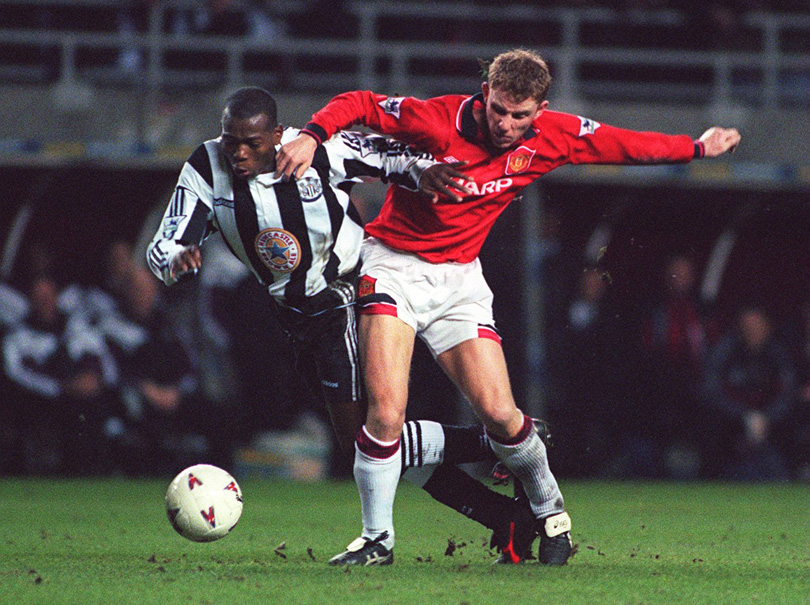
But early in the second half, Newcastle were hit with a sucker punch. “I remember getting dragged infield, and when they dinked the ball to the back post, I thought: ‘Oh s**t’,” recalls Beresford. “And when the ball came to [Eric] Cantona I threw everything in the way. If he had caught the ball properly, it would have smashed straight into me and probably rebounded out for a throw-in or a corner, but he scuffed it into the ground and it went under me and into the far corner of the net. There are certain moments in every player’s career that you replay in your head, and that’s one of mine, but it’s one of those things – I’m not still having therapy or anything!
“What I remember just as clearly, though, is a chance I had in the first half, but I overran the ball and Schmeichel gathered it. I remember David Batty turned to me and said: ‘You had a chance to nail him there’, and he was right. I should’ve just left my foot in on Schmeichel and taken a booking. I know it sounds cynical but he was ridiculously good that season – even better than Cantona – and in that game especially. There are certain players you need to stop from having influence any way you can. He’s a lot bigger than me, mind, so I’d have had to get in there quick and then piss off!”
Shell-shocked from Cantona’s goal, the Toon were a shadow of their first-half selves and Ferguson’s side ran out comfortable winners (albeit by a single goal). Just one point now separated the two teams. “There was an eerie silence in the changing room afterwards,” says Beresford. “Keegan said: ‘Look, we’ve played well – don’t get down about it. Let’s go again.’”
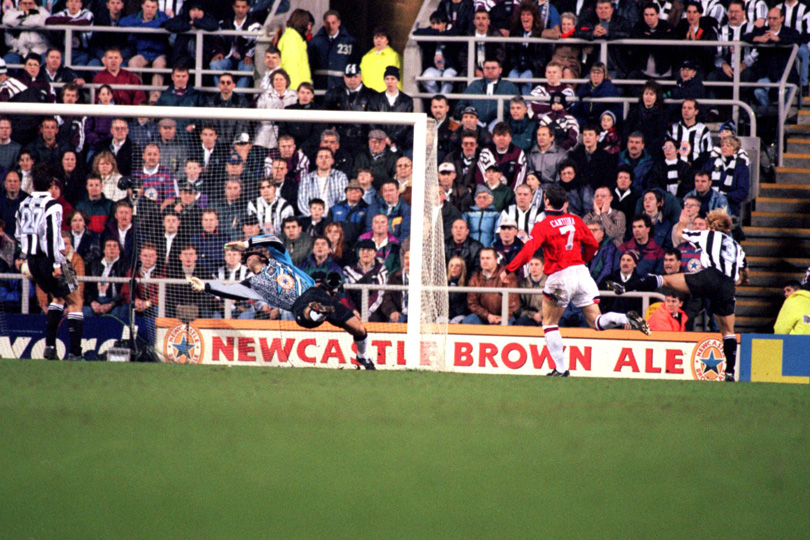
And go again they did, winning their next game 3-0 against West Ham. Beresford continues: “It’s a misconception that it all fell apart after that game, and I still find that frustrating now. Two seasons later, Manchester United were miles ahead of Arsenal [leading by 11 points in March] but nobody accused them of throwing it away. But because of the way we played, nobody gave Manchester United credit for playing better in the second half of the season. I don’t look back on that game and think: ‘That was when we lost the league’ – although it certainly didn’t help.”
GAMES Laying the groundwork • Vinnie in goal • Just score one more • One-nil to United • Collymore closing in • "I'd love it"
Liverpool 4-3 Newcastle United
Anfield, April 3, 1996
I saw on the map that Newcastle was by the sea and, well, what was I supposed to think other than beaches and somewhere hot?
When Faustino Asprilla rolled up on Geordie shores in a lavish fur coat at the start of 1996, the Colombian striker was tasked with one mission: to help Newcastle United secure their first league title in 69 years.
His only visit to England had been on a balmy August day for a friendly between England and Colombia at Wembley the year before. Newcastle in the depths of an unforgiving winter would provide stark contrast to Tino’s first taste of English life.
“I saw on the map that Newcastle was by the sea and, well, what was I supposed to think other than beaches and somewhere hot?” Asprilla asks FFT. “I was imagining yachts in the harbour and somewhere with sun!”
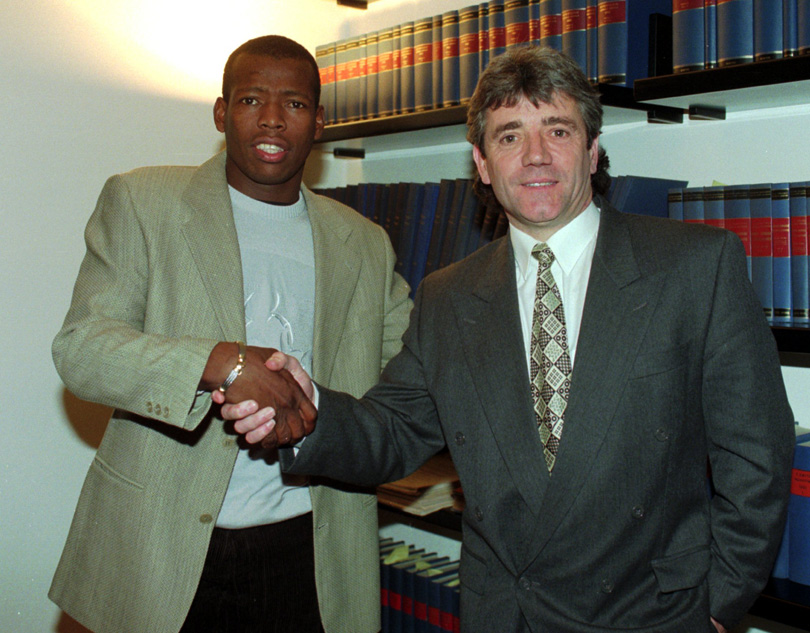
And while the sun did come out on the day Tino arrived at St James’ Park, he was left far from impressed. “One minute it was raining, the next minute there was sun, and then two minutes later it started snowing,” he recalls. “I thought: ‘Where the hell am I?’”
Despite the challenges posed by the climate, Asprilla quickly settled into life on the Tyne. Even as Newcastle’s faltering form began to bite into their lead at the top, the Colombian was an instant hit – no more so than when the championship race exploded into life on a Wednesday night in April at Anfield, less than two months after his Newcastle debut.
“We were second behind Man United but had two games in hand on them and a win would draw us level,” Asprilla remembers. “It was also a chance to extend our lead over Liverpool. It was a huge match, but nobody could have expected what would unfold that night – it was so strange.”
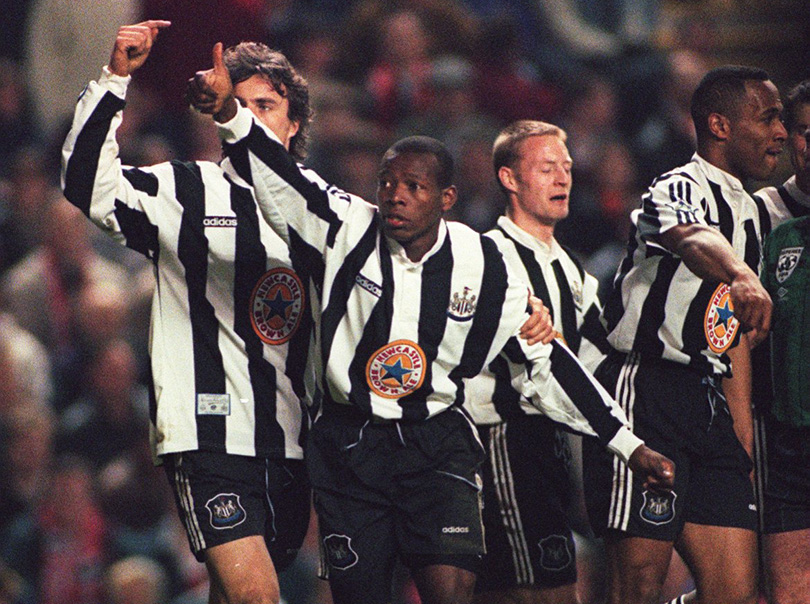
Robbie Fowler had put Liverpool ahead with just two minutes on the clock, alert at the back post to nod home a Stan Collymore cross.
“I remember Fowler scored early, but we hit back straightaway and went 2-1 up,” Asprilla explains. It was the Colombian who expertly wriggled through the Liverpool defence to tee up strike partner Ferdinand for the equaliser. Ginola gave the visitors the lead minutes later.
“We were winning and I could hear 7,000 Newcastle fans singing at the tops of their voices while the rest of the stadium was silent,” Asprilla continues. “You could just hear ‘Newcastle, Newcastle, Newcastle’ ringing around the stadium. Imagine that in a place like Anfield!”
Ten minutes into the second half Fowler drew the game level with his second of the night, but parity lasted only two minutes. “Robert Lee saw me and I set off sprinting so he sent me through,” Asprilla recalls. “I could see their keeper [David James] rushing towards me and I hit it hard first time. I knocked it past him. It was a really nice goal.
You could just hear ‘Newcastle, Newcastle, Newcastle’ ringing around the stadium. Imagine that in a place like Anfield!
But still the ding-dong clash was far from over. Midway through the second period, Collymore snatched a goal back by connecting with Jason McAteer’s teasing ball. 3-3.
“It gave Liverpool the momentum,” Asprilla admits. “With a few minutes left we were waiting for the final whistle, so when Collymore scored in the last second it was like somebody throwing a bucket of cold water over the entire team. Honestly, if they’d scored five minutes before, we’d have chased the draw and got it, but there just wasn’t time.”
For Asprilla, though, Newcastle didn’t lose their grasp on the championship trophy with that 4-3 defeat: “Titles aren’t lost with one game. We lost the league because of the way we approached other games.”
Keegan’s despondent face may have said otherwise as he lay slumped over the advertising hoarding upon the final whistle, head crumpled into his arms. Says Asprilla: “I don’t remember what Kevin said after the game – I just remember his face. And that image speaks louder than a thousand words.”
GAMES Laying the groundwork • Vinnie in goal • Just score one more • One-nil to United • Collymore closing in • "I'd love it"
Leeds United 0-1 Newcastle United
Elland Road, April 29, 1996
Even though they won the game and kept their title hopes alive, it was the night that many still associate with the end of Newcastle’s championship challenge
Newcastle did what they had to do at Elland Road, grabbing the kind of 1-0 win associated with their rivals Manchester United that season. But even though they won the game and kept their title hopes alive, it was the night that many still associate with the end of Newcastle’s championship challenge – the night Kevin Keegan lost and Alex Ferguson won.
A Monday night trip to Leeds brought the first of three matches in the final seven days of the season for Newcastle, who had two games in hand over the Red Devils but now trailed Ferguson’s men by six points and a goal difference margin of seven.
Manchester United had scraped past a 10-man Leeds a fortnight earlier, triumphing 1-0 at Old Trafford. Ferguson had suggested Leeds had raised their game just because they were facing Manchester United – the insinuation being that they wouldn’t do the same against Newcastle. Leeds gave them a scare, though, twice hitting the woodwork before Keith Gillespie headed in the only goal.
“We played Leeds away on the Monday, Nottingham Forest on the Thursday and then Tottenham in the last game of the season on the Sunday,” midfielder Lee Clark tells FFT. “We knew we probably had to get nine points. It was a tall order, but we won the game against Leeds, so we did the first part.”
Then came the rant that defined a season – maybe even a man. Keegan had been irked by Ferguson’s comments about Leeds, but also by reports that the Scot was unhappy Newcastle would face Forest in a crucial league match only a week before returning to the City Ground as opponents for Stuart Pearce’s testimonial. The apparent insinuation was, again, that Pearce and Forest might take it easy.
We’re still fighting for this title, and he’s got to go to Middlesbrough and get something. And I tell you, I will love it if we beat them – love it
“That sort of stuff – we’re bigger than that,” raved Keegan, becoming ever more irate. “When you do that with footballers, like he said about Leeds, and when you do things like that about a man like Stuart Pearce… I’ve kept really quiet, but he went down in my estimation when he said that.
“We have not resorted to that, but you can tell him now, if he’s watching, we’re still fighting for this title, and he’s got to go to Middlesbrough and get something. And I tell you, I will love it if we beat them – love it.”
The players were oblivious to that rant until Keegan climbed onto the team coach, ready for the drive back to Newcastle.
“We hadn’t really paid much attention to Ferguson’s comments; it hadn’t been spoken about before the game,” Clark says. “After the game, the manager came onto the coach and said he’d had a little bit of a pop at somebody in the media. When we saw it on TV, we were gobsmacked.
“The lads had a bit of fun with him before the Forest game. We were well aware that’s what he was about. He was very, very passionate. If he felt something wasn’t right, he’d tell people, be they his players or people from outside the club.
“It wasn’t that stress had got the better of him. He would have done that in the first game of the season if someone had questioned an opponent he had respect for.”
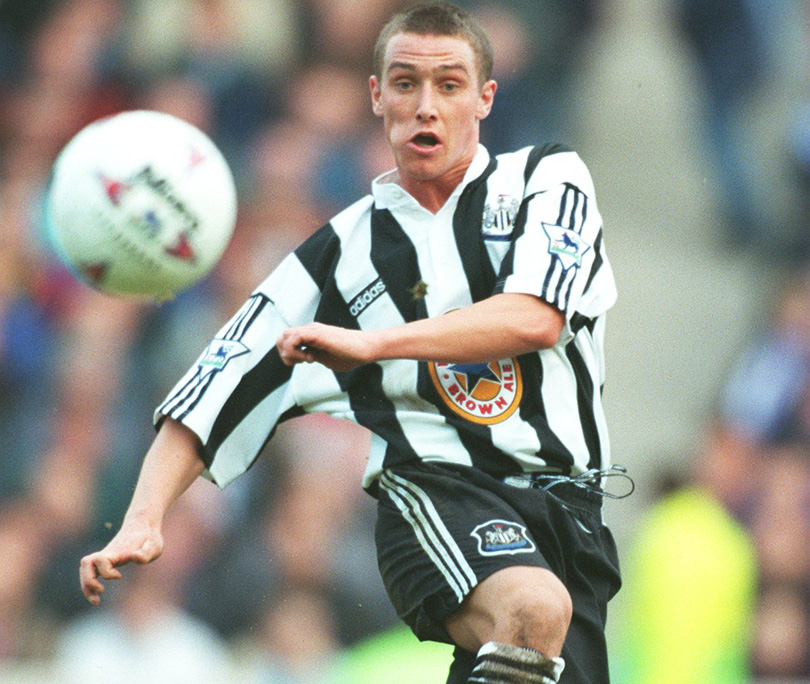
In the end, Newcastle drew 1-1 at Forest to go into the final day two points behind.
“We just hoped Middlesbrough could do something at home to Manchester United, but unfortunately it wasn’t the case,” Clark says, sadly. “We were very popular all around the country – we were everyone’s second-favourite team. It’s just a shame we didn’t get the silverware to top it all off.”
The team didn’t feel, however, as if this was the end – especially when Alan Shearer was taken from under Manchester United’s noses and brought to his hometown club for a world-record £15m fee, before the new term brought emphatic wins over their previous season’s conquerors (5-0) and Spurs (7-1).
But in January 1997 Keegan quit, saying he’d taken Newcastle – then fourth – as far as he could. Kenny Dalglish led them to second, but the Magpies never truly challenged. John Hall stepped down as chairman that year, and one by one, players left and the Great Entertainers were gone – but not forgotten.
GAMES Laying the groundwork • Vinnie in goal • Just score one more • One-nil to United • Collymore closing in • "I'd love it"
Words: Louis Massarella, Richard Edwards, Carl Worswick, Chris Flanagan
This feature first appeared in the April 2016 issue of FourFourTwo magazine. Subscribe!
